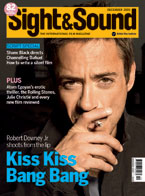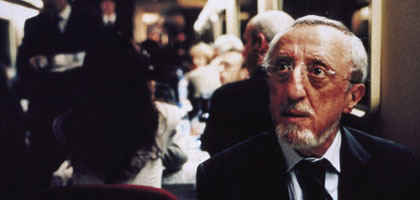
Closely observed train
Film of the Month: Tickets

Abbas Kiarostami, Ken Loach and Ermanno Olmi chart the emotional odyssey of six characters over the course of a railway journey from Austria to Rome. Roger Clarke finds that he enjoys the ride
The idea for Tickets originated in an informal conversation between producers Carlo Cresto-Dina and Babak Karimi. But it wasn't until Abbas Kiarostami met his chosen collaborators Ken Loach and Ermanno Olmi that the film's form and narrative premise fell into place. Though it's tempting to see Loach and Olmi's contributions as mere wings to the triptych's central piece (indeed, one famous critic ostentatiously left the screening I attended the minute Kiarostami's section finished), it was Olmi who came up with the conceit of the train journey, and it's his lustrous and extraordinarily textured first section that opens the film.
Carlo Delle Piane, a regular in the films of Olmi's compatriot Pupi Avati, plays an elderly pharmacist (anonymously dubbed "the professor") experiencing travel chaos in Austria. He's been away on business but is expected back home in Rome for the birthday party of his grandson. His scheduled flight has run into problems, but Valéria Bruni Tedeschi's angel of an Austrian PA (she has golden hair and appears almost to be floating) has found him a ticket for an intercity train. He's impressed that she has booked him for two meal sittings in the dining car so he will be assured a seat for the duration of the journey. Yet some kind of security crisis seems to be affecting the train. In a scene chillingly reminiscent of countless World War II-set scenarios, before the journey begins soldiers and police patrol the station concourse as Tannoys bark German and German Shepherd dogs nose around. The passengers look confused, intimidated and a little frightened. There's a scent of madness in the air.
Delle Piane's character bears precious little resemblance to that other Italian chemist, Primo Levi. With his fashionable flat cap, neat white beard, rimless spectacles and indignation at being asked for identity papers by a passing policeman, there's something absurd about him. And there's a whisper of Visconti's late movies about ageing and memory in the way he descends into reveries about ethereal blondes. As Chopin is played in the carriage (a fellow passenger cannot get his CD player earpiece to operate) the professor tries to write a letter of thanks to Bruni Tedeschi's PA, which elides, via memories of childhood experiences of music, into fantastical confessions of romantic attraction. The more he dreams of girls playing pianos and candlelit dinners with his angel, the more he is given to little whimsical skips and euphoric gambols. His dainty rejection and then acceptance of an aperitif is in some sense the 'strawberry moment' of Death in Venice. The professor confesses in voiceover, to be "daydreaming like a teenager". Yet here is a man facing old age who cannot even decide on the way to address his correspondent, relentlessly writing and rewriting his opening sentence.
What's especially noticeable about this first section is how Olmi uses sound - the boom of station noise, overheard music and conversations, babies squalling in corridors, the sometimes deafening rattle of the train fading in and out of muffled private moments - to get around the restrictions of space imposed by the train location. But try as he might, the professor can't help but be drawn back to the reality of the carriage's night-mirrored window and the army officer (who looks oddly like Jean-Claude Van Damme, but isn't) sitting scowling opposite him. The soldier speaks only accented English - the new voice of international imperialism, we must understand - but his greatest crime is causing a mother to spill her baby's milk as she hunkers down to feed the child in the crowded corridor between carriages. As the professor asks the waiter to bring him some warm milk so he can take it to the mother, and the train staff mop up the spillage, which looks so much like a puddle of blood, the moment of final resignation comes: the sleep of old age and the old grown helpless like babies again.
From St. Jerome to the rampaging rhinocerine Madonna of Kiarostami's central section, which is shot in daylight. A woman in late middle-age, with white hair and a string of pearls, boards the train with a host of suitcases gamely carried by a young assistant. She treats him as a lover, a toyboy, a kept man; but it later transpires that he appears to be on some form of national service, and that she is a widow on the way to a memorial service for her army-general husband. Silvana De Santis plays the woman with sweaty, angry energy; nothing will stand in her way and she will co-operate with no one she considers beneath her. The young man, played by Filippo Trojano, has a sad expression and beautiful eyes, which are later accentuated by the flat lighting Kiarostami deploys when the man is talking to a young friend of his sister whom he meets in the corridor (and of whom De Santis' character is jealous). This frontality, this sense of painted iconography, is homage enough to Kiarostami's late friend Pier Paolo Pasolini (Kiarostami's charcoal sketch of Pasolini hung in the bedroom of the Rome flat of the Italian director's muse, Laura Betti, until her death last year).
By the conclusion of this second segment De Santis and Trojano's characters have rowed and separated. She leaves the train alone and unaided, but not before one of the best sequences in the film, which harks back to one of the Iranian director's longstanding obsessions and involves an argument over mobile phones (Kiarostami considers them a curse of modernity). The performances in this section are generally the best in the movie, and the final bust-up between Kiarostami's characters, shot through Venetian blinds with the reflection of the countryside rushing past, is quite beautiful.
And so to Ken Loach. His section does little with the space or the noise of the environment, and concentrates squarely on character - with a touch of comedy thrown in. His protagonists are fans of Celtic Football Club: three of them, all young men, travelling to Rome, like Chaucerian pilgrims, for a Champions League match. They've brought a huge bag of sandwiches from their Asda workplace to feed themselves along the way. After one of them gives a sandwich to a young Albanian boy they discover the lad has stolen a train ticket from them. There is then a moral struggle as the Scots talk to the family of the boy and have to make a quick decision about letting them keep the ticket. Is the family genuinely in need, or are they crooks? With Loach we always know the wisdom of the working man will shine through, and so it does. The Celtic fans make the right call, and the fraternity of football fandom gathered at the station in Rome helps the seemingly fare-dodging trio to evade the police. If Loach delivers easily the least rich and imaginative section of the film, it's a satisfyingly light conclusion to Olmi's frightening opening gambit and a welcome return to normality.
